Homemade herbal tinctures are extracts of a plant, nut, bean or fruit. Through maceration, the medicinal benefits take a liquid form. Do you want to spend 75-150$ or get the same thing for 6$?
This is the story of how I woke one day and thought: “let’s save money and make herbal tinctures at home”. I remember being mystified by the idea of placing cucumber slices on your eyes to reduce puffiness as a teen. Then I saw a recipe to make a mask for my face with something like an egg white and honey. After that is was mayonnaise or olive oil as a hair mask. I eagerly ‘devoured’ all these homemade beauty recipes.
As I got older I got more curious about healing myself with natural remedies. I have no issues with taking a prescription pill but I won’t say no to trying a more natural route, as a stand-alone treatment or as a compliment. A vinegar hair rinse cleared my itchy scalp problem and peppermint essential oil rubbed on my temple and forehead can clear headaches. My latest big homemade remedy discovery is herbal tinctures.
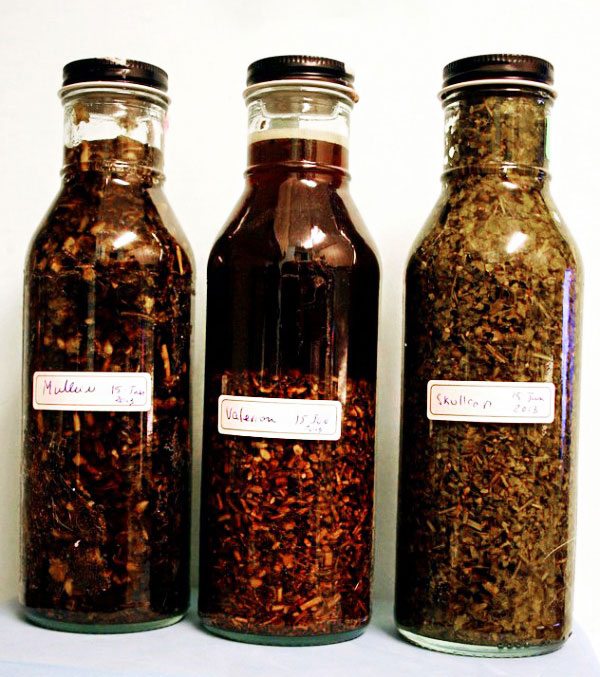
Valerian and Skullcap for Insomnia
I have become a herbal tinctures convert in the last year or so. A tincture is an extract of a plant, a nut, a bean or a fruit, just like vanilla extract. Maceration is the name of the process that transfers the medicinal benefits into a liquid form. Although alcohol is not the only liquid form used, I have found it is the best by far.
I discovered these herbal tinctures remedies when I tried a bottle of valerian tincture for 25$+ for my insomnia. As a sufferer of episodes of chronic insomnia (I leave the specialists baffled and have done every test and therapy), I like to call valerian tincture my black gold: love the bottle I bought but not the price! I did a bit of research and found out how to make it myself for a fraction of the cost, about 6$.
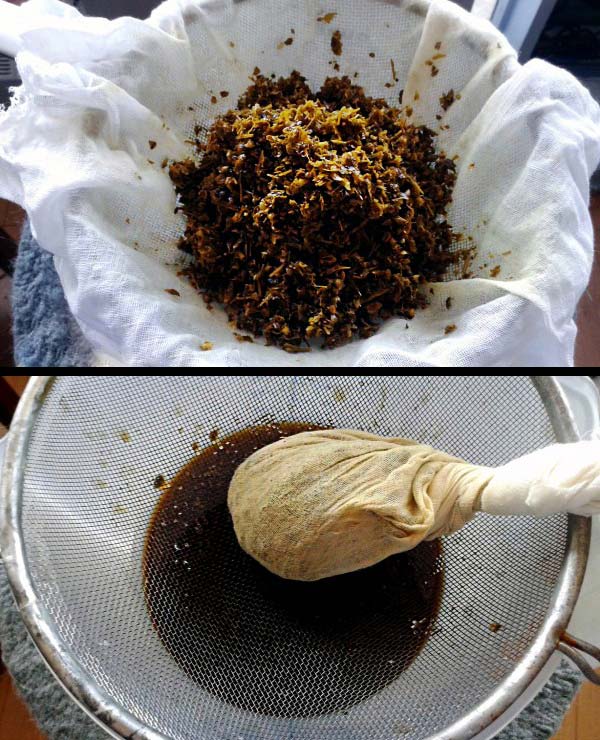
Since then I have experimented with other herbal tinctures too for asthma, coughs, general health and other issues. Obviously the first part of making a tincture is determining what benefits you want to get out of it and then choosing the herb which can deliver these benefits.
My sleep potion is now made of half valerian and half skullcap tinctures. Put about 30 drops in a bit of water and drink. When desperate it works best in a glass of warm milk. It is my “go to” tactic when I am at the really desperate insomnia stage.
A Universal Herbal Tincture Recipe
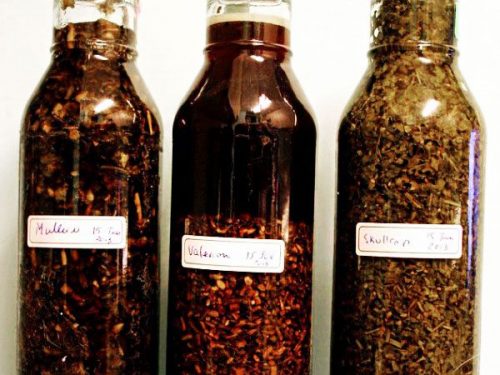
Homemade Herbal Tinctures
Ingredients
For fresh herbs
- 1 oz fresh chopped herb to 2 oz of 95% alcohol
For dried herbs
- 1 oz dried herb to 5 oz of 40% alcohol
Instructions
- Fill a glass jar with herbs without packing them down. Add alcohol to jar and put the lid on the jar.
- Shake well and store the jar in a cool dark place, shaking the jar daily, for 4 to 6 weeks.
- Strain through a cheesecloth, squeezing the herbs to extract as much liquid as possible.
- Store the tincture in a glass jar in a dark place. Never leave your tincture in sunlight.
Hey did you know I am now on Youtube? Please SUBSCRIBE!
IMPORTANT: The key to a good tincture is exact measurements. Measure accurately for consistent results from batch to batch. I always use vodka as my alcohol. There is an exception to the measurement rule. Depending on the dried herb, 5 oz of vodka may not be enough to get your 1 oz of herbs soaked. In this case, top off your herbs with enough alcohol to just cover it.
DOSAGE: Just put a few drops in a glass of water and drink. How many drops? Here is my recommendation: if you are taking as a preventive measure I suggest 5-10 drops, 3 times daily. If you are in crisis (like a cold) then go for 20-30 drops, 3 times daily. In the case of my insomnia potion I take it before bed only once a day, about 30 drops. It takes me about 15 minutes to feel the sedation.
Save a lot of Money
50 ml bottles of tincture cost between 15$ to 30$ depending on the herb. If you go through a bottle a month it can get very expensive. One batch of my tincture recipe can last you about 5 months and will cost 6$. Do you want to spend 75-150$ or get the same thing for 6$ Homemade herbal tinctures rule!
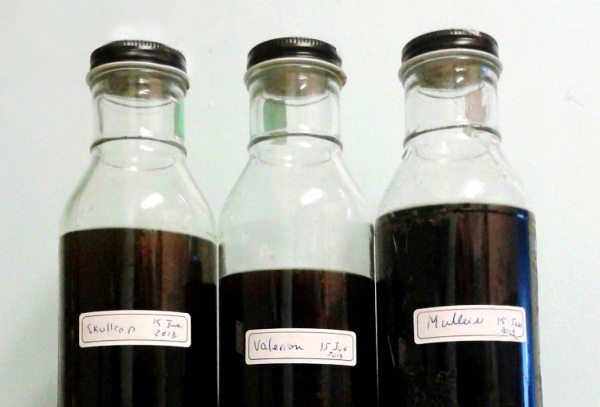
A few herbal tincture suggestions:
- Lavender: for relaxation and sleep.
- Turmeric: anti-inflammatory, relieves pains, reduces blood sugar, cleans the liver, helps digestion.
- Mullein: great for colds, respiratory problems, bronchitis, and asthma.
- Echinacea: strengthens immune system when sick, respiratory problems, soothes sore throats.
- Vanilla beans: make you own vanilla extract for baking.
- any cooking herbs: a liquid form of cooking herbs for the kitchen.
—————————————————————-
Two Must Have Reference Books
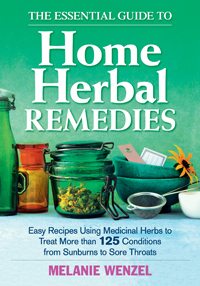
There are a few tincture recipes to be found in the The Essential Guide to Home Herbal Remedies, by Melanie Wenzel. So it is a great place to start to learn which herbs should be used for which ailment. If you want a more in depth knowledge of herbs I recommend looking into Ayurvedic herb books. But to stay on topic, this book includes 68 easy recipes using medicinal herbs to treat more than 125 conditions from sunburns to sore throats. Each remedy includes step-by-step instructions on what you need to do. This comprehensive book will teach you the easiest and most popular natural remedies.
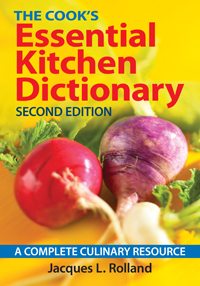
Another great reference book I received recently is the The Cook’s Essential Kitchen Dictionary, 2nd edition, by Jacques Rolland. How often do you come across an unfamiliar term or ingredient in a recipe? This book is here to answer those very questions quickly. I particularly like it for exotic ingredients. You will find at your fingertips over 5,000 definitions in this kitchen dictionary, along with history notes, etymology, anecdotes, origins and culture. For example did you know there are at least 13 different kinds of basil?
The products featured in this post were provided to me free of cost by www.robertrose.ca. Any personal opinions reflected in this post are my own and without influence.
Check out my other posts with home remedies for insomia or sleep problems:
- Try a cup of Golden Milk a day before bed
- Let a few pinches of Sleepy Dust melt under your tongue
- Enjoy a warm cup of this Sedative Herbal Tea mix before going to sleep

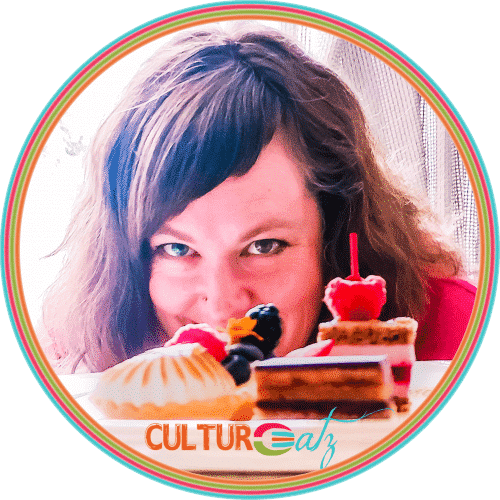


Is there a limif to the amount of herba in a recipe?
You can follow these proportions
For fresh herbs
1 oz fresh chopped herb to 2 oz of 95% alcohol
For dried herbs
1 oz dried herb to 5 oz of 40% alcohol
I loved this post. I also make tinctures and take about one teaspoon daily of my combination herbs. Would you say that its too much alcohol, since I do not drink at all otherwise? thank you
1 teaspoon in 5ml. I see dosage normally as 1ml 2 or 3 times a day. So it may be a tad much. It’s not about the alcohol, but the dose of the herbs.
I have heard that Lanolin helps with insomnia. Using an organic wool with the lanolin oils still intact helps tremendously with sleep. When my twin grandsons were babies,we had a difficult time getting them to stay asleep and get needed rest esp when they were teething. I heard about lanolin and found this cute lambskin blanket. Anyway,my daughter would cover them with it and boy did it do the trick.
Thanks Kelly for that tip about lanolin, I am going to look into it!
I cannot remember the last time I made my own tinctures! Thanks for the reminder of how easy they are to do at home 🙂
My pleasure Tandy 🙂
I’m so happy to hear about making a tincture for sleep! I’ve tried different things over the years and now it’s Magnesium and Calcium with about 5 mg of Melatonin. The idea of using a home made tincture sounds much healthier and less expensive!
Hi Elaine, oh yeah I was using melatonin but it wears off after a while, and I did different magnesium. Just stopped taurine as well. I really hope you find the tinctures effective. I use for middle of the night wake ups. Make sure to check out my next new post this week it is also another natural sleeping aid.
I’m so impressed that you have made herbal tinctures at home. I’ll have to remember that lavender is helpful for sleep and relaxation when I try to do this myself.
Thank Mindi, it is really easy to make and you will love the lavender. Dual purpose you can also add it to baking!
You multi-talented girl! This is a great post. Nothing like a natural and home remedy for all the problems. I must try these out.
This is really interesting…something new to me. I usually meditate when I am unable to sleep. Not only am I able to sleep post that but I also tend to sleep well.
Any tincture for hair fall?
Taruna, wish meditation worked as well for me. Here is a great link with ideas on hair loss and it mentions the best herbs for tinctures too. http://holisticonline.com/remedies/hair/hair_loss_herbs.htm
Evelyne, I am a believer in essential oils and I am going crazy about them each day. I’m trying to reduce my intake of medications specially pain killers I am almost addicted to them :(. I love your post, just wondering can I make a non-alcoholic version?
Hi Amira, there are non alcoholic methods. The tincture will not be as potent so perhaps up the dosage. These methods use either vinegar or glycerine. They have a shorter lifespan and need to be refrigerated. Here is a link that explains the process for glycerine: http://wellnessmama.com/8168/herbal-tinctures/
Thank you all for your amazing comments. I have held back such post thinking them a bit of topic but with this response expect more 🙂
Cool post, Evelyne. I pour vinegar on my head too after just washing it with a very basic, clean soap. I haven’t got to making my own home remedies but I stay away from doctors as far away as I can. Good remedies there, thanks for sharing.
i gotta sent this post to my sister who need a tincture!!!
G’day! What an interesting post today Evelyn that I was glad I did now miss and never mind aging gracefully!
Cheers! Joanne
Ooh, I need some valerian tincture stat! I love hearing about alternative medicine…terrific info.
I love this, Evelyne — such a great alternative use for nature’s bounty.
This is something completely new to me. I wonder if there’s anything to deal with hair loss..
Angie, here is a great link with ideas on hair loss and it mentions the best herbs for tinctures too.
http://holisticonline.com/remedies/hair/hair_loss_herbs.htm
Thanks, Evelyne. Didn’t know catmint helps too.
Have a lovely weekend!
Angie
I desperately need to make your tincture for insomnia as I have become an insomniac in my older years. A very interesting and informative post! Thanks!